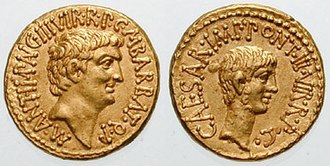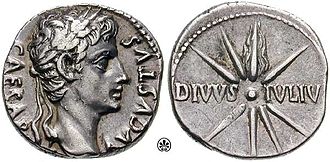Augustus





Augustus (23 September 63 BC – 19 August AD 14) was the founder of the Roman Empire and its first Emperor, ruling from 27 BC until his death in AD 14. He was born Gaius Octavius Thurinus in Rome, into an old and wealthy equestrian branch of the Octavii family. Following the assassination of his great-uncle Julius Caesar in 44 BC, Octavius discovered that he was Caesar's adopted son and heir. This led to a series of events that culminated in Octavius's victory over Mark Antony and Cleopatra in the Battle of Actium in 31 BC. After this victory, Octavius restored the outward facade of the free Roman Republic, with governmental power vested in the Roman Senate, but in reality, he retained his autocratic power over the Republic as a military dictator. His status was legitimized by the Senate's grant of the title "Augustus" in 27 BC, marking the beginning of the Roman Empire.
Early Life[edit]
Augustus was born as Gaius Octavius Thurinus in Rome on 23 September 63 BC. His father, also named Gaius Octavius, was a governor of Macedonia, and his mother, Atia, was a niece of Julius Caesar. After the early death of his father, Octavius was raised by his grandmother, Julia, the sister of Julius Caesar.
Rise to Power[edit]
The assassination of Julius Caesar in 44 BC was a turning point in Octavius's life. Being named Caesar's heir, he returned to Rome to claim his inheritance and quickly emerged as a key political player. Octavius, Mark Antony, and Marcus Aemilius Lepidus formed the Second Triumvirate to defeat Caesar's assassins. However, the alliance was fraught with tensions, leading to a civil war. Octavius's forces defeated those of Antony and Cleopatra at Actium, leaving him the unchallenged ruler of Rome.
Reign and Achievements[edit]
As the first Roman Emperor, Augustus's reign was marked by relative peace known as the Pax Romana. His reforms stabilized the economy, secured the borders, and initiated a period of significant architectural and cultural achievements. He established a standing army, created the Praetorian Guard, and reformed the tax system. Augustus also patronized the arts, leading to a flourishing of literature and architecture.
Death and Legacy[edit]
Augustus died in AD 14 at the age of 75. He was succeeded by his stepson Tiberius. His reign had established a period of peace and prosperity, and he was deified by the Senate shortly after his death. Augustus's legacy includes the transformation of Rome from a republic to an empire, which lasted for centuries beyond his reign.

This article is a ancient Rome–related stub. You can help WikiMD by expanding it!
-
Augustus
Ad. Transform your life with W8MD's Budget GLP-1 injections from $49.99


W8MD offers a medical weight loss program to lose weight in Philadelphia. Our physician-supervised medical weight loss provides:
- Weight loss injections in NYC (generic and brand names):
- Zepbound / Mounjaro, Wegovy / Ozempic, Saxenda
- Most insurances accepted or discounted self-pay rates. We will obtain insurance prior authorizations if needed.
- Generic GLP1 weight loss injections from $49.99 for the starting dose of Semaglutide and $65.00 for Tirzepatide.
- Also offer prescription weight loss medications including Phentermine, Qsymia, Diethylpropion, Contrave etc.
NYC weight loss doctor appointmentsNYC weight loss doctor appointments
Start your NYC weight loss journey today at our NYC medical weight loss and Philadelphia medical weight loss clinics.
- Call 718-946-5500 to lose weight in NYC or for medical weight loss in Philadelphia 215-676-2334.
- Tags:NYC medical weight loss, Philadelphia lose weight Zepbound NYC, Budget GLP1 weight loss injections, Wegovy Philadelphia, Wegovy NYC, Philadelphia medical weight loss, Brookly weight loss and Wegovy NYC
|
WikiMD's Wellness Encyclopedia |
| Let Food Be Thy Medicine Medicine Thy Food - Hippocrates |
Medical Disclaimer: WikiMD is not a substitute for professional medical advice. The information on WikiMD is provided as an information resource only, may be incorrect, outdated or misleading, and is not to be used or relied on for any diagnostic or treatment purposes. Please consult your health care provider before making any healthcare decisions or for guidance about a specific medical condition. WikiMD expressly disclaims responsibility, and shall have no liability, for any damages, loss, injury, or liability whatsoever suffered as a result of your reliance on the information contained in this site. By visiting this site you agree to the foregoing terms and conditions, which may from time to time be changed or supplemented by WikiMD. If you do not agree to the foregoing terms and conditions, you should not enter or use this site. See full disclaimer.
Credits:Most images are courtesy of Wikimedia commons, and templates, categories Wikipedia, licensed under CC BY SA or similar.
Translate this page: - East Asian
中文,
日本,
한국어,
South Asian
हिन्दी,
தமிழ்,
తెలుగు,
Urdu,
ಕನ್ನಡ,
Southeast Asian
Indonesian,
Vietnamese,
Thai,
မြန်မာဘာသာ,
বাংলা
European
español,
Deutsch,
français,
Greek,
português do Brasil,
polski,
română,
русский,
Nederlands,
norsk,
svenska,
suomi,
Italian
Middle Eastern & African
عربى,
Turkish,
Persian,
Hebrew,
Afrikaans,
isiZulu,
Kiswahili,
Other
Bulgarian,
Hungarian,
Czech,
Swedish,
മലയാളം,
मराठी,
ਪੰਜਾਬੀ,
ગુજરાતી,
Portuguese,
Ukrainian
